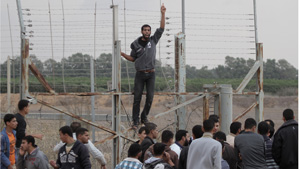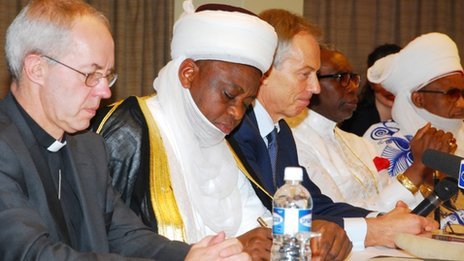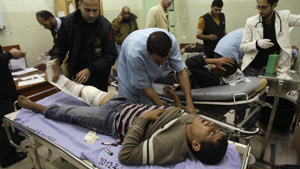Violence In Israeli
By James Liu
A wounded Palestinian is treated at a hospital in the southern Gaza Strip on Friday after Israeli gunfire at the Gaza border killed one Palestinian wounded several others. (Ibraheem Abu Mustafa/Reuters)

Palestinian youths gesture during a demonstration next to the security fence standing on the Gaza border with Israel, east of Khan Yunis, in the southern Gaza Strip, on Friday. A Palestinian was shot dead by Israeli forces near the Gaza border after he entered a no-zone near the fence. (Said Khatib/Agence France-Presse/Getty Images)
On Friday, hundreds of Palestinians approached Israel's border fence in several locations in southern Gaza, according to an Associated Press television cameraman. In the past, Israel's military has barred Palestinians from getting close to the fence, and soldiers opened fire routinely to enforce a no-go zone meant to prevent infiltrations into Israel.
Since the ceasefire, growing numbers of Gazans have entered the no-go zone.
In one incident captured on video, several dozen Palestinians, most of them young men, approached the fence, coming close to a group of Israeli soldiers standing on the other side.
Some Palestinians briefly talked to the soldiers, while others appeared to be taunting them with chants of "God is Great" and "Morsi, Morsi," in praise of Egyptian President Mohammed Morsi, whose mediation led to the truce.
At one point, a soldier shouted in Hebrew, "Go there, before I shoot you," and pointed away from the fence, toward Gaza. The soldier then dropped to one knee, assuming a firing position. Eventually, a burst of automatic fire was heard, but it was not clear whether any of the casualties were from this incident.
Gaza health official Ashraf al-Kidra said a 20-year-old man was killed and 19 people were wounded.
Israel's military said roughly 300 Palestinians approached the security fence at several locations in southern Gaza, tried to damage it and cross into Israel. Soldiers fired warning shots in the air to distance the Palestinians from the fence, but after they refused to move back, troops fired at their legs, the military said. It also said a Palestinian infiltrated into Israel in the course of the unrest, but he was returned to Gaza.
Leaders meet in CairoThe truce allowed both Hamas and Israeli Prime Minister Benjamin Netanyahu to step back from the brink of a full-fledged war. Over eight days, Israel's aircraft carried out some 1,500 strikes on Hamas-linked targets, while Gaza fighters peppered Israel with roughly the same number of rockets.
The fighting killed 166 Palestinians, including dozens of civilians, and six Israelis.
In Cairo, Egypt was set to hold separate talks Friday with Israeli and Hamas envoys on the next phase of the ceasefire — a new border deal for blockaded Gaza. Hamas demands a lifting of all border restrictions, while Israel insists that Hamas must halt weapons smuggling to the territory.
In Israel, a poll showed that about half of Israelis think their government should have continued its military offensive against Hamas.
The independent Maagar Mohot poll released on Friday shows 49 per cent of respondents feel Israel should have kept going after squads that fire rockets into Israel. Thirty-one per cent supported the government's decision to stop. Twenty per cent had no opinion.
Twenty-nine per cent thought Israel should have sent ground troops to invade Gaza.
The poll of 503 respondents had an error margin of 4.5 percentage points.
The same survey showed Prime Minister Benjamin Netanyahu's Likud Party and electoral partner Israel Beiteinu losing some support, but his hard-line bloc still able to form the next government. Elections are Jan. 22.
Since the ceasefire, growing numbers of Gazans have entered the no-go zone.
In one incident captured on video, several dozen Palestinians, most of them young men, approached the fence, coming close to a group of Israeli soldiers standing on the other side.
Some Palestinians briefly talked to the soldiers, while others appeared to be taunting them with chants of "God is Great" and "Morsi, Morsi," in praise of Egyptian President Mohammed Morsi, whose mediation led to the truce.
At one point, a soldier shouted in Hebrew, "Go there, before I shoot you," and pointed away from the fence, toward Gaza. The soldier then dropped to one knee, assuming a firing position. Eventually, a burst of automatic fire was heard, but it was not clear whether any of the casualties were from this incident.
Gaza health official Ashraf al-Kidra said a 20-year-old man was killed and 19 people were wounded.
Israel's military said roughly 300 Palestinians approached the security fence at several locations in southern Gaza, tried to damage it and cross into Israel. Soldiers fired warning shots in the air to distance the Palestinians from the fence, but after they refused to move back, troops fired at their legs, the military said. It also said a Palestinian infiltrated into Israel in the course of the unrest, but he was returned to Gaza.
Leaders meet in CairoThe truce allowed both Hamas and Israeli Prime Minister Benjamin Netanyahu to step back from the brink of a full-fledged war. Over eight days, Israel's aircraft carried out some 1,500 strikes on Hamas-linked targets, while Gaza fighters peppered Israel with roughly the same number of rockets.
The fighting killed 166 Palestinians, including dozens of civilians, and six Israelis.
In Cairo, Egypt was set to hold separate talks Friday with Israeli and Hamas envoys on the next phase of the ceasefire — a new border deal for blockaded Gaza. Hamas demands a lifting of all border restrictions, while Israel insists that Hamas must halt weapons smuggling to the territory.
In Israel, a poll showed that about half of Israelis think their government should have continued its military offensive against Hamas.
The independent Maagar Mohot poll released on Friday shows 49 per cent of respondents feel Israel should have kept going after squads that fire rockets into Israel. Thirty-one per cent supported the government's decision to stop. Twenty per cent had no opinion.
Twenty-nine per cent thought Israel should have sent ground troops to invade Gaza.
The poll of 503 respondents had an error margin of 4.5 percentage points.
The same survey showed Prime Minister Benjamin Netanyahu's Likud Party and electoral partner Israel Beiteinu losing some support, but his hard-line bloc still able to form the next government. Elections are Jan. 22.
Nigeria riot over "blasphemy" against islam's prophet
By Daniel Hyun

A rumour that a Christian man blasphemed against Islam has sparked a riot in the northern Nigeria town of Bichi, police have said.
Residents said four people were killed and shops were looted.
Christian and Muslim leaders are encouraging inter-faith dialogue in Nigeria
The riot came on the day the incoming head of the Anglican Church, the Rt Rev Justin Welby, launched an initiative to promote religious tolerance in Nigeria.
Religious clashes have claimed thousands of lives in Nigeria since military rule ended in 1999.
The militant Islamist group, Boko Haram, has also been waging an insurgency since 2009 to impose strict Sharia across Nigeria, which is roughly divided between a mainly Muslim north and a Christian and animist south.
'Learning about religions' Nigeria's Kano state police chief Ibrahim Idris said "misinformation" had triggered the riot, AFP news agency reports.
"Rumours went round that someone blasphemed the Prophet [Muhammad] and there was a breakdown of law and order," he is quoted as saying.
The BBC's Yusuf Ibrahim Yakasai in Kano, the main city in northern Nigeria, says that a heavy contingent of soldiers and policemen have been deployed to Bichi to restore order.
It is a small town about 30km (18 miles) from Kano.
Mr Idris said the riot broke out when a Christian tailor mispronounced the name of a dress while chatting with his Muslim neighbour in Hausa, the main language spoken in the north, changing the meaning to "the Prophet has come to the market", AFP reports.
Angry Muslim youths then attacked Christian-owned shops, looting and burning them, he said.
Residents said four Christians were killed, but Mr Idris could not confirm this.
Our reporter says some residents gave him a different account of what caused the riot.
They told him that a Muslim crowd first attacked a Christian man for wearing a T-shirt that they alleged blasphemed against the Prophet Muhammad.
In the capital, Abuja, Bishop Welby joined Nigerian Muslim and Christian religious leaders and former UK Prime Minister Tony Blair to launch a campaign to promote religious tolerance.
The Tony Blair Faith Foundation - which organised the programme - got students from Christian and Muslim communities in Nigeria to chat via a video link with students from different faiths in the UK city of Derby.
Bishop Welby is a former oil executive who will become the Archbishop of Canterbury in March.
He has visited Nigeria 70 times, and was the special envoy to Africa for the outgoing Archbishop of Canterbury, Rowan Williams, who is stepping down after 10 years in the role.
Residents said four people were killed and shops were looted.
Christian and Muslim leaders are encouraging inter-faith dialogue in Nigeria
The riot came on the day the incoming head of the Anglican Church, the Rt Rev Justin Welby, launched an initiative to promote religious tolerance in Nigeria.
Religious clashes have claimed thousands of lives in Nigeria since military rule ended in 1999.
The militant Islamist group, Boko Haram, has also been waging an insurgency since 2009 to impose strict Sharia across Nigeria, which is roughly divided between a mainly Muslim north and a Christian and animist south.
'Learning about religions' Nigeria's Kano state police chief Ibrahim Idris said "misinformation" had triggered the riot, AFP news agency reports.
"Rumours went round that someone blasphemed the Prophet [Muhammad] and there was a breakdown of law and order," he is quoted as saying.
The BBC's Yusuf Ibrahim Yakasai in Kano, the main city in northern Nigeria, says that a heavy contingent of soldiers and policemen have been deployed to Bichi to restore order.
It is a small town about 30km (18 miles) from Kano.
Mr Idris said the riot broke out when a Christian tailor mispronounced the name of a dress while chatting with his Muslim neighbour in Hausa, the main language spoken in the north, changing the meaning to "the Prophet has come to the market", AFP reports.
Angry Muslim youths then attacked Christian-owned shops, looting and burning them, he said.
Residents said four Christians were killed, but Mr Idris could not confirm this.
Our reporter says some residents gave him a different account of what caused the riot.
They told him that a Muslim crowd first attacked a Christian man for wearing a T-shirt that they alleged blasphemed against the Prophet Muhammad.
In the capital, Abuja, Bishop Welby joined Nigerian Muslim and Christian religious leaders and former UK Prime Minister Tony Blair to launch a campaign to promote religious tolerance.
The Tony Blair Faith Foundation - which organised the programme - got students from Christian and Muslim communities in Nigeria to chat via a video link with students from different faiths in the UK city of Derby.
Bishop Welby is a former oil executive who will become the Archbishop of Canterbury in March.
He has visited Nigeria 70 times, and was the special envoy to Africa for the outgoing Archbishop of Canterbury, Rowan Williams, who is stepping down after 10 years in the role.

 RSS Feed
RSS Feed